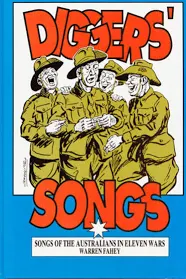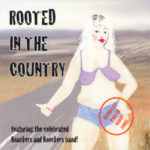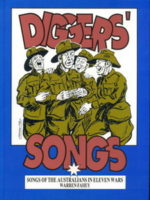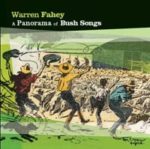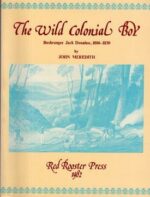Description
My task as a folklorist is that of a recycling unit! I scour the country collecting the bits and pieces that we recognise as ‘folklore’ and then, through books, recordings, radio and now the internet, I deliver it back, with or without comment, to the people who rightfully ‘own’ this heritage or, at least participated in the creative process that gave them their start in life.
As Australia inevitably moves towards a more multi-cultural society it also becomes more important that we understand and appreciate the ‘how’s, why’s and where’s’ of our folklore for it is through these expressions of our creative memory that we express our fears, frustrations and aspirations. It is also through our folklore heritage that we record and document our social history.
This is not to say that folklore is history for it is clearly not and ‘the folk’ have shown that they have little regard for accurate accounting of their history – a case of never letting the truth get in the way of a good story! What folklore does offer is the emotional history of our march through the years and all the facts and figures, dates and names are nothing when compared to the often heart-wrenching reminiscences of someone who was there and wished that he or she was not! Listen to a returned soldier repeatedly telling the tales that have been told hundreds of times before and you will discover stories to chill the bone. You will also hear tales of mateship and of heroic deeds carried out as matter of fact for this was the way of the ‘Digger’ at war.
It also has to take into account that such ‘storytelling’ is part of a very old traditional process and although the songs and stories are regarded as ‘community property’ or ‘public domain’ the storyteller often feels a need to embellish the story ‘for the good of the listener’. This is why it is not unusual to find someone telling a story in the first person when he or she was not actually present at the event – in these cases the story or song has usually been so importantly intertwined with their own life that they believe that they were a witness to the event. I rush to say that this is not lying for it appears to be an emotional mechanism that is very much a part of the tradition.
Surveying the songs in this collection you will gain a real insight into how the folklore process works. Several of the songs will travel with you and a commercial song like ‘Tipperary’ or ‘A Wee Doch and Doris’ will feature in two or three wars with obvious changes of text. It is also fascinating to see how the songs were used in the various wars. In the Sudan and Boer wars, the songs tended to reflect the flavour of nationalistic parlour songs complete with matching sentiment and doggerel. The first and second World Wars saw popular song being the most accepted parody vehicle whilst the Malayan and Korean wars saw the songs turn more introspective. Vietnam saw the American influence grow stronger and, of course, the circulation of a whole genre of songs against Australia’s involvement in this war. The most traditionally circulated song to emerge out of the Gulf war was a current popular song that lent its title to a different beat as Phil Collin’s ‘Something In The Air Tonight’ took on new meaning.
I have long been fascinated by how songs travel and the military songs are an ideal study because of the way military service people travel around moving from one confrontation to the next. It is fairly easy to appreciate that a song could be carried from camp to camp, war zone to war zone by a travelling soldier and just as easy to imagine that the very same soldier could have sung the song in the local bar where airforce or naval servicemen could have heard the song, related to it, and took it with them as they themselves travelled on.
By definition folk songs or traditional songs, and that definitely includes parodies, are those songs passed on by oral transmission as opposed to the printed page. The truth is that no matter what the original songwriter’s intentions, the travels and fate of the song depends on how it is influenced by history, politics and cultural situations. I am sure the original writer of ‘Tipperary’ never dreamed about how many parodies would ride along on the same melody! One can only speculate on why a particular tune can tickle the fancy of so many people. To understand the folklore process one needs to look back in time because in so many ways our entertainment patterns have changed and continue to change.
At the time when Australia was being used as a colonial goal, the broadside ballad was in its heydey and the printers surrounding the Seven Dials area of London acted as the popular press reporting on savage murders, sensational transportation sentences and the latest news from the soldiers at the front.
These stories, court decisions and military despatches were promptly turned into ballads which were printed and sold as ‘penny dreadfuls’ and, in many cases, were set to popular old tunes indicated on the ballad sheet. Most of the military songs tended to be reports of ‘gallant soldiers’ and of ‘glorious battles’ however the printers and ballad writers were not beyond publishing songs about unfair recruiting practices and even songs that criticised particularly harsh military leaders. The ‘folk’ loved these ballads, especially the more sensational, and many of these songs became firmly entrenched in the tradition and down through the years the stories became more embellished by the contributions of the ‘folk’. The style of singing would have been primarily unaccompanied as this was the style of the day and dictated by the reality that most working class families simply could not afford the luxury of a musical instrument. It is also related to the fact that the singing of songs served several purposes – many of the songs were thought of as ‘family songs’ as they had been passed down through several generations; they had often been localised to mention family and friends; they were educational in as much as many poor families had used the broadsheets as a tool for learning as books were too expensive and lastly, the everyday situations where such songs would have been sung, including taverns and as part of traditional ceremony, would have commanded a song ‘at the ready’. At the same time, the upper classes were singing a more patriotic type of ballad or song accompanied by the pianoforte. Australian baritone, Peter Dawson, recorded numerous ‘art’ songs to bolster the troops during the war years.
One suspects that the soldiers and sailors of the time would have been singing rather robust backroom ballads whilst their officers would have been singing their continued loyalty to the throne. Jumping ahead in time (about fifty years) entertainment had experienced a dramatic change and the most important disseminator of song was the music hall. These were the ‘people’s palaces’ of song and the working class packed these halls in both England and Australia to listen to an endless parade of performers who not only sang about ‘Corned Beef And Carrots’ but also about the growing unrest in Europe and especially the growing threat of Germany. Thankfully this era coincided with the revolution in the printing industry which led to popular presses which churned out affordable printing including endless volumes of song books. The piano, ukulele, guitar, banjo, mandolin and mouth organ also became extremely popular and as millions practised their scales there developed a huge market for popular songs. By the time World War One was declared these songs had already gained unbelievably wide circulation. Next came the phonographic cylinder then the disc gramophone and, following close behind, the electric wireless all destined to carry the songs even further
225 pages, Casebound Illus A4
